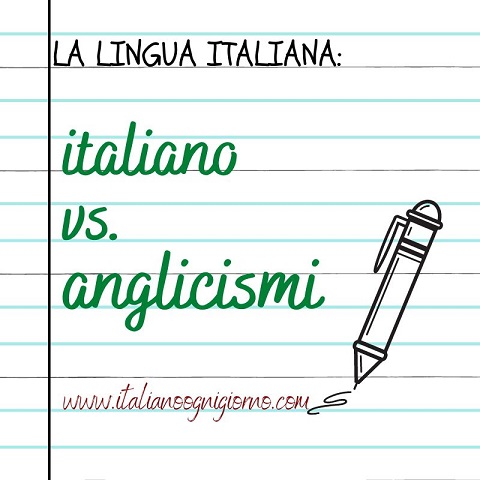(English version below)
Non vogliamo fare la guerra all’inglese, ma vogliamo rammentare ai parlanti italiani che in molti casi esistono parole italiane utilizzabili, comode e trasparenti. Vogliamo provare a proporle a tutti come possibile alternativa, per promuovere la grande ricchezza lessicale ed espressiva della nostra lingua.
Claudio Marazzini
(Presidente dell’Accademia della Crusca)
La domanda che ci poniamo in tanti dopo la proposta di legge sulla lingua italiana del Governo Meloni è questa: Dobbiamo proteggere la lingua italiana dai forestierismi, le parole straniere, e in particolare dall’inglese?
La legge vieterebbe l’uso di termini inglesi in certi ambiti, come la Pubblica Amministrazione, la comunicazione pubblica, nei contratti di lavoro o per specificare i ruoli in azienda e prevederebbe multe da 5000 a 100.000.
E’ un’illusione pensare di poter fare leggi contro l’invasione delle parole? Oppure come suggeriscono gli esperti linguisti, “l’unico vero intervento efficace per la salute della lingua italiana è garantire che tutti abbiano la migliore istruzione possibile e che l’ insegnamento dell’italiano faccia acquisire una migliore consapevolezza linguistica – per tutti e quindi anche per i futuri legislatori, politici e comunicatori pubblici.”
Il desiderio di emulare gli anglofoni ha origini lontane. La parola anglicismo veniva infatti già utilizzata nel 18esimo secolo. Era un periodo in cui l’Europa guardava con ammirazione alle conquiste coloniali, politiche e tecnologiche dell’Inghilterra, il che ha dato il via all’adozione di parole d’origine inglese, gli anglicismi per l’appunto, un’onda che ha seguito un’altra, quella dei francesisimi.
Dei nostri giorni la globalizzazione assieme alla diffusione di termini inglesi nella tecnologia digitale ha reso l’afflusso di anglismi patologico.
Difatti nel 2015 l’Accademia della Crusca, uno dei principali punti di riferimento in Italia e nel mondo per le ricerche sulla lingua italiana, aveva lanciato una petizione per incoraggiare l’uso di parole italiane invece di quelle inglesi.
Gli anglicismi hanno sostituito se non addirittura cancellato quelle italiane.
Guardando il notiziario sentiamo “hub” energetico, quando invece la parola “centro” o “fulcro” sarebbe meglio capita dalla maggioranza degli italiani. Oppure le famose “expenditures” del governo…forse per evitare la parola più limpida:“spese”?
Per non parlare di molte leggi italiane con nomenclature inglesi, tipo: “Il Jobs Act”, “Il Green Pass”,….ecc.
Nelle strade sentiamo parlare di “news”, invece che di “notizie”, di “weekend” invece che di “fine settimana”. Per quanto mi riguarda, quando parlo l’inglese, parlo l’inglese; quando parlo l’italiano, parlo l’italiano e lo stesso vale per il francese e altre lingue che mi diletto ad imparare.
Allora, riinnamoriamoci dell’italiano ascoltando Alessandro Baricco che legge e spiega”La cognizione del dolore” di Carlo Emilio Gadda (noto come il Joyce italiano)
– attivare i sottotitoli per una migliore comprensione –
Lo scrittore Alessandro Baricco inizia dicendo che i grandi scrittori riescono a nominare la vita, le cose. E’ una cosa preziosa perché si danno i nomi alle cose per difendersi da esse.
“I grandi scrittori sono straordinari perché sanno nominare le zone più semplici e complicate della nostra esperienza. Non raccontano solo storie, nominano la vita…
Gadda lavorava con la nostra lingua e siamo gli unici al mondo che possiamo veramente capire e goderci fino in fondo cosa lui ha fatto. Tutte le traduzioni perdono per strada molto di quello che lui era riuscito a combinare. Sapeva nominare le cose più strane con una esattezza e bellezza quasi irripetibili.
Leggiamo due capoversi di circa dieci righe dell’ultima pagina del libro “La cognizione del dolore”, un libro che non ha mai finito (lui non amava molto finire le cose).
Una vecchia signora che è stata aggredita di notte e sta per morire, ma non si sa se morirà. Hanno passato la notte a cercare di curarla e adesso lei è stesa nel suo letto in una stanza in un’agonia silenziosa nell’ultimo brandello di notte prima dell’alba.”
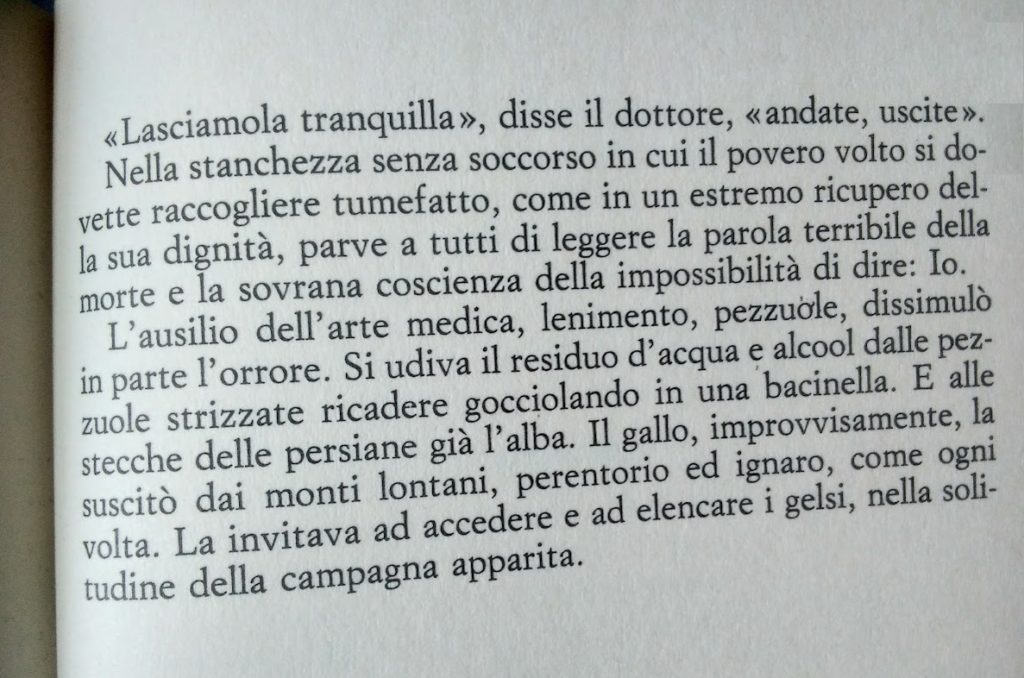
“Lasciamola tranquilla”, disse il dottoe. Andate, uscite.
Nella stanchezza senza soccorso in cui il povero volto si dovette raccogliere tumefatto, come in un estremo recupero della sua dignità, parve a tutti di leggere la parola terribile della morte e la sovrana coscienza dell’impossibiltà di dire: Io.”
“Si fa fatica a tenere insieme questo corpo che sta per morire. E pensiamo se tutto finisce così allora cosa si salva di tutto quello che ho fatto. Perché facciamo tutto questo? Tutto questo lo sappiamo, ma a saperla a dire in una riga con esattezza…..”
“L’ausilio dell’arte medica, lenimento, pezzuole, dissimulò in parte l’orrore. Si udiva il residuo d’acqua e alcool delle pezzuole strizzate ricadere gocciolando in una bacinella.”
“Una inquadratura cinematografica molto stretta. Lui te la vende come un suono ‘si udiva‘, ma in realtà te la sta facendo vedere.”
“E alle stecche delle persane, già l’alba.”
“C’era da dire che stava per cominciare il giorno. Gadda era preciso. Non dice persiane, ma alle stecche e non c’è verbo. L’alba infatti si vede nelle stecche delle persiane. Più sei esatto e non vago, più quel nome resisterà.”
“Il gallo, improvvisamente, la suscitò dai monti lontani, perentorio e ignaro, come ogni volta. La invitava ad accedere e ad elencare i gelsi, nella solitudine della campagna apparita.”
“Elencare i gelsi….arriva la luce, il primo gelso, il secondo….E’ quello che fa la luce: elenca. In tre parole c’è un movimento e un senso della bellezza… La danza dell’alba che nessuna traduzione nel mondo potrebbe salvare. Noi possiamo sentire la danza dell’alba. Gadda aveva il senso della bellezza.
Quest’ultima frase molto italiana, è melodia, è un canto, oltre ad essere precisa, esatta, è musica.
Chiunque di noi sente che quella è la musica giusta, ritmo e melodia.
L’ultima frase del tema “nome” tac…..per sempre….
Noi abbiamo una bellissima lingua, l’italiano, che lui usava da Dio.”
Letture consigliate:
Nuove leggi sull’italiano. Ma sono davvero “politica linguistica”?
Petizione per la lingua italiana
https://www.treccani.it/enciclopedia/anglicismi_(Enciclopedia-dell’Italiano)/
English version:
“We don’t want to wage war on English, but we want to remind Italian speakers that in many cases there are usable, comfortable and transparent Italian words. We want to try to offer them to everyone as a possible alternative, to promote the great lexical and expressive richness of our language.”
Claudio Marazzini
(President of the Accademia della Crusca)
The question that many of us are asking after the Meloni government’s bill on Italian language is this: Should we protect the Italian language from foreign words, and in particular from English?
The law would prohibit the use of English terms in certain areas, such as the Public Administration, public communication, in employment contracts or to specify roles in a company and would provide for fines from 5,000 to 100,000.
Is it an illusion to think you can make laws against the invasion of words? Or as linguist experts suggest, “the only truly effective intervention for the health of the Italian language is to ensure that everyone has the best possible education and that teaching Italian leads to better linguistic awareness – for everyone and therefore also for future lawmakers, politicians and public communicators.”
The desire to emulate English speakers has distant origins. The word Anglicism was in fact already used in the 18th century. It was a time when Europe looked up to England’s colonial, political and technological achievements, which gave rise to the adoption of words of English origin, anglicisms to be precise, a wave that followed another one, that of the frenchisms.
Today’s globalization coupled with the spread of English terms into digital technology has made the influx of Anglicisms pathological.
In fact, in 2015 the Accademia della Crusca, one of the main points of reference in Italy and in the world for research on the Italian language, had launched a petition to encourage the use of Italian words instead of English ones.
Anglicisms have replaced or even canceled Italian words.
Watching the news we hear about “hub” energetico, when instead the words “centro” or “fulcro” energetico would be better understood by the majority of Italians. Or the famous government “expenditures”… perhaps to avoid the clearer word: “spese” in Italian?
Not to mention many Italian laws with English nomenclature, such as: “The Jobs Act”, “The Green Pass”,….etc.
In the streets we hear “news” instead of “notizia”, “weekend” instead of “fine settimana”. For me, when I speak English, I speak English; when I speak Italian, I speak Italian, and the same goes for French and other languages that I enjoy learning.
So, let’s fall in love with Italian again by listening to Alessandro Baricco read and explain “La cognizione del dolore” / “The Cognition of Pain” by Carlo Emilio Gadda (known as the Italian Joyce)
– activate the subtitles of the video above for a better understanding –
The writer Alessandro Baricco begins by saying that great writers manage to name life, things. It is a precious thing because things are given names to defend ourselves against them.
“Great writers are extraordinary because they know how to name the simplest and most complicated areas of our experience. They don’t just tell stories, they name life…
Gadda worked with our language and we are the only ones in the world who can truly understand and fully enjoy what he did. All translations lose much of what he had managed to accomplish by the wayside. He knew how to name the strangest things with almost unrepeatable accuracy and beauty.
We’ll read two paragraphs about ten lines long from the last page of the book “The Cognition of Pain”, a book he never finished (he didn’t really like finishing things).
An old lady who was attacked at night and is about to die, but it is not known whether she will die. They spent the night trying to treat her and now she lies in her bed in a room in silent agony in the last shred of night before dawn.”
“Let’s leave her alone,” said the doctor. Go, exit.
In the unaided tiredness in which the poor face had to compose itself swollen, as in an extreme recovery of its dignity, everyone seemed to read the terrible word of death and the sovereign awareness of the impossibility of saying: I. “
“It’s hard to keep this body together that is about to die. And if we think that everything ends like this then what is saved from everything I’ve done. Why do we do all this? We know all this, but knowing how to say it in one line with accuracy…..”
“The aid of medical art, soothing, cloths, partly concealed the horror. You could hear the residue of water and alcohol from the squeezed cloths dripping into a basin.”
“A very tight cinematic shot. He’s selling it to you as a sound, but he’s actually showing it to you.”
“And at the slats, it’s already dawn.”
“It had to be said that the day was about to begin. Gadda was precise. He doesn’t say shutters, but on the slats and there is no verb. In fact, dawn can be seen in the slats of the shutters. The more exact you are and not vague, the more that name will last.”
“The rooster suddenly aroused her from the distant mountains, peremptory and unaware, as every time. He invited her to enter and list the mulberry trees, in the solitude of the countryside that appeared.”
“List the mulberries….the light comes, the first mulberry, the second….It’s what the light does: it lists. In three words there is a movement and a sense of beauty… The dance of the dawn that no translation in the world could save. We can feel the dance of the dawn. Gadda had a sense of beauty.
This last phrase is very Italian, it is melody, it is a song, as well as being precise, exact, it is music.
All of us feel that this is the right music, rhythm and melody.
The last sentence of the theme “name” tac….. forever….
We have a beautiful language, Italian, which he used like God.”
Recommended reading:
Nuove leggi sull’italiano. Ma sono davvero “politica linguistica”?
Petizione per la lingua italiana
https://www.treccani.it/enciclopedia/anglicismi_(Enciclopedia-dell’Italiano)/
- Racconto italiano: La disdetta del frullato al cacao A2/B1

- Come si usa il gerundio
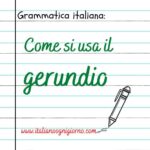
- Racconto italiano: La gatta sull’albero /A2

- Racconto italiano: Le scale al nuovo anno /B2
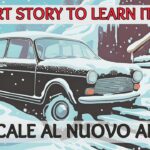
- 32 frasi ipotetiche del primo tipo in italiano
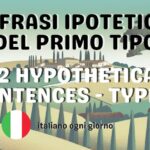
- Una rassegna: Cosa abbiamo studiato in italiano nel 2024?
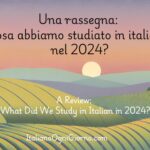
- Racconto italiano: Un giorno perfettamente imperfetto /A2

- Racconto italiano: Le scale al nuovo anno /A1


